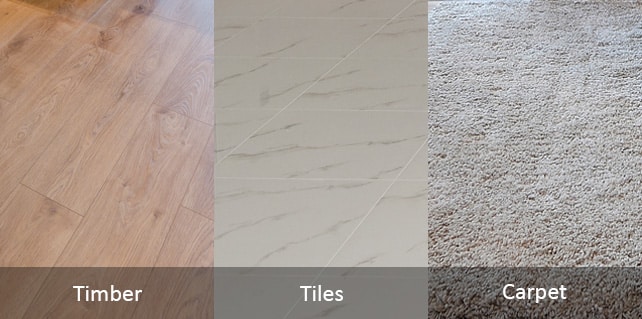Are you thinking of updating your investment property flooring? Regardless of whether you recently bought a property which requires attention or the aging flooring in your old investment property needs a makeover, it pays to weigh up your options before reaching a decision.
Investment Property Flooring Options
While the options for flooring solutions become ever wider, the three most common options are: carpet, wood and tiles. Each has its own advantages and disadvantages. Some properties may use all three in a single property. Therefore, we hope the information below will help you make the right decision for your investment property flooring.
Carpet Flooring
Advantages
• Comfort
The most significant benefit of carpet flooring is the comfort that it can provide. The soft texture of carpet is cozy and inviting, especially in colder seasons.
• Household Safety
Soft carpet provides a safety barrier for children and the elderly who may be prone to falling.
Disadvantages
• Maintenance
Without a doubt, the maintenance required to keep carpet clean must be one of the major drawbacks of carpet flooring. To keep it clean, a regular, perhaps annual deep cleaning is required. If your property is rented out, you can only hope that the tenant has a good schedule of vacuuming and cleaning the carpet.
• Prone to damage and stains
Carpet is a highly sensitive material. An area that gets much foot traffic may leave irreversible marks. It’s also easy to be stained from things which are dropped on the floor.
Verdict: Carpet flooring certainly has advantages. It provides exceptional comfort other materials can’t which is why it’s often the preferred material for bedrooms. But it also has disadvantages which expose it to many risks especially when you use it in a rental property.
Timber Flooring
Advantages
• Easy to maintain
Properly treated timber flooring is resistant to stains and dirt. A regular sweeping and damp mopping may be all that is required to keep it clean.
• Naturally versatile
One of the biggest reasons people choose timber flooring is the natural warm look of timber. The versatile character of timber works well in many settings.
Disadvantages
• Vulnerable to damage and moisture
Timber flooring is still vulnerable to dents and scratches if care is not taken. It’s also vulnerable to moisture, so you can’t use it in wet areas and any moisture on its surface must be wiped off quickly.
• Maintenance
To preserve the original look of a shiny timber floor, a regular sealing is essential. Arranging with the tenant to move their furniture so as to seal the flooring once a year may prove difficult at times.
Verdict: Timber flooring is exceptionally beautiful and if proper care is taken, it can last for a long time. However, its vulnerability exposes it to risks when care is not shown by the tenant of your rental property.
Tiles
Advantages
• Durable
Tiles are the most durable material you can buy for your flooring. While there are many types of tiles, some of the most practical ones are ceramic and porcelain tiles. They are almost resistant to anything including water and frost if installed properly.
• Wide Variation
Tiles come in a wide variety of forms. Some are made of natural stones, such as travertine, each piece having a unique and distinctive character. Porcelain tiles also come in an ever growing range of styles such as polished, lappato, concrete look and timber look. So you won’t find it hard to find the right product you’re looking for.
• Price
While not all tile retail stores are the same, it is possible to find tiles at reasonable prices.
Disadvantages
• Hard surface
The hard surface of tiles may lack the warm comfort of soft carpet. It feels colder compared to carpet in cold climates.
• Weight
In some circumstances such as an upper floor installation, the weight of tiles as well as the adhesive must be taken into consideration.
Verdict: In an investment property setting, tiles are the most practical option you can choose for flooring. The wide variety of tiles ensures that you will find just the right product for your property.
As you can see, each material has its advantages and disadvantages. But considering the risks involved with rental properties, one can’t help but think that tiles are the most practical and safe option for investment property flooring.


